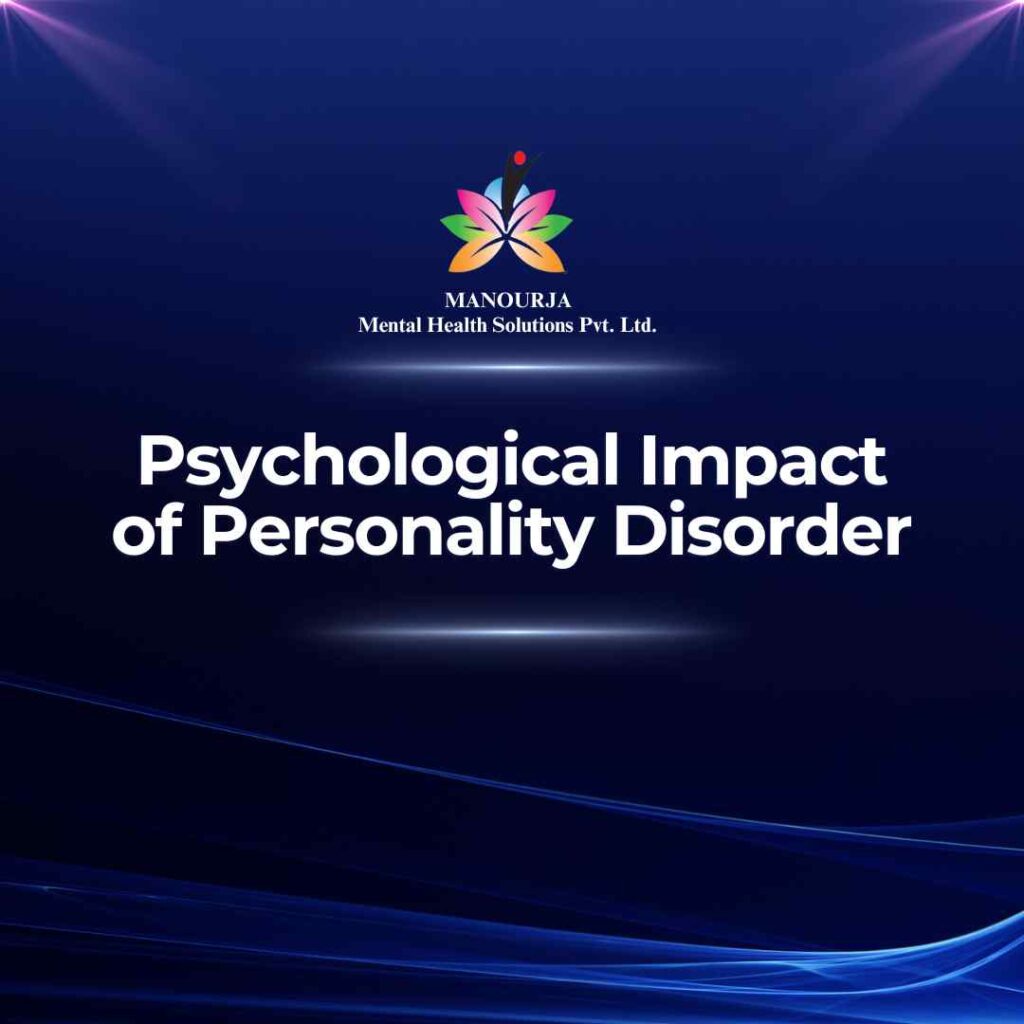Psychological Impact of Personality Disorder

Personality disorders significantly impact an individual’s psychological well-being, influencing their thoughts, emotions, behaviors, and overall mental health. The psychological impact of these disorders is profound and pervasive, affecting many aspects of life.
Here are key areas where the psychological effects of personality disorders are most evident:
Self-Image and Identity
- Unstable Self-Image: Common in disorders like Borderline Personality Disorder (BPD), where individuals might have a poorly developed or rapidly changing sense of self. This instability can lead to sudden changes in values, aspirations, or professional goals, often leading to feelings of emptiness and confusion.
- Distorted Self-Perception: In disorders such as Narcissistic Personality Disorder (NPD), individuals may have an inflated sense of self-importance or a grandiose perception of their abilities, which can lead to significant interpersonal conflicts when challenged.
Interpersonal Relationships
- Difficulty Forming or Maintaining Relationships: Many personality disorders are characterized by challenging interpersonal dynamics, ranging from a pervasive distrust of others in Paranoid Personality Disorder to fears of abandonment in BPD.
- Conflict and Instability: Relationships may be fraught with conflict, misunderstandings, and instability. For example, individuals with BPD may experience intense and unstable relationships, swinging between idealization and devaluation (splitting).
- Social Isolation: Avoidant Personality Disorder may lead to social inhibition and feelings of inadequacy, causing individuals to withdraw from social interactions to avoid criticism or rejection.
Emotional Regulation
- Emotional Dysregulation: Many personality disorders involve significant difficulties in managing emotions. For instance, individuals with BPD can experience rapid and intense mood swings without much external cause.
- Chronic Feelings of Negative Emotions: Persistent feelings of sadness, anger, or fear are common, impacting the individual’s ability to function daily.
Cognitive Functions
- Maladaptive Thought Patterns: Cognitive distortions such as all-or-nothing thinking, catastrophic thinking, or overgeneralization are common across various personality disorders. These distorted thinking patterns can perpetuate personal distress and dysfunctional behaviors.
- Impulsivity: Difficulty in controlling impulses can lead to reckless behavior, substance abuse, and self-harm, particularly noted in BPD and Antisocial Personality Disorder (APD).
Behavioral Patterns
- Compulsive or Repetitive Behaviors: Obsessive-Compulsive Personality Disorder (OCPD) and other personality disorders can include strict routines or rituals that are adhered to rigidly.
- Self-Destructive Behaviors: This can include self-harm, suicidal behaviors, and substance abuse, often as a way to cope with overwhelming emotions or to punish oneself.
Impact on Work and Productivity
- Inconsistent Performance: Fluctuations in mood and self-image can affect performance at work or school. Individuals might show great enthusiasm for projects initially but lose interest swiftly.
- Workplace Conflicts: Interpersonal difficulties and inflexible behavior can lead to conflicts with colleagues and supervisors, impacting career progression and stability.
Quality of Life
- Reduced Life Satisfaction: Chronic emotional distress, relationship problems, and ongoing personal struggles significantly reduce overall life satisfaction and well-being.
- Challenges in Achieving Personal Goals: The instability in relationships, self-image, and emotions can hinder personal growth and the achievement of long-term goals.
Addressing the psychological impacts of personality disorders typically involves a combination of psychotherapy, medication, and support groups. Therapies like Dialectical Behavior Therapy (DBT), Cognitive Behavioral Therapy (CBT), and other psychotherapeutic approaches can help individuals better understand and manage their behaviors, thoughts, and emotions, ultimately improving their quality of life.
At MANOURJA, we believe in the transformative power of counseling. Our experienced therapists offer a safe and supportive space where you can explore your thoughts, emotions, and challenges. Through personalized counselling sessions, we’ll work together to develop coping strategies, build resilience, and achieve lasting positive change. Discover the path to a healthier, happier you with MANOURJA counselling services.
MANOURJA Rehabilitation Services
At MANOURJA, we’re dedicated to helping you in rebuild your life, after difficult times. Our rehabilitation services focus on understanding what you need to move forward, whether you’re recovering from addiction, trauma, or any psychological – social challenges. We create personalized plans, that are all about helping you, regain your strength and find hope again. With a caring team by your side, you’ll have the support to make real progress and take steps toward a brighter, healthier future
